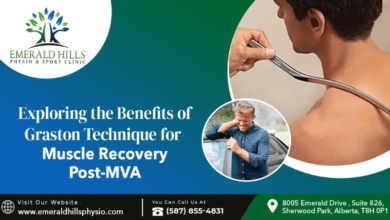Physiotherapy for Addressing Muscle Strain in the Chest After a Collision

Muscle strain in the chest is a common injury following a motor vehicle accident(MVA), often leading to significant discomfort and restricted movement. Chest pain resulting from this type of injury can make everyday tasks challenging, affecting posture and overall mobility. MVA physiotherapy plays a crucial role in addressing muscle strain and helping individuals regain strength and function. Motor vehicle accident physiotherapy in Beaumont focuses on targeted treatments that reduce chest pain, restore mobility, and promote a full recovery. Through personalized exercises and manual therapy, physiotherapy supports a quicker and safer rehabilitation process for those dealing with chest muscle strain after a collision.
What is Chest Muscle Strain After a Collision?
Chest muscle strain following a collision occurs when the muscles in the chest are overstretched or torn due to the sudden force of the accident. This can happen when the chest hits the steering wheel, is restrained by the seatbelt, or is impacted by the airbag. Symptoms typically include sharp or aching chest pain, difficulty with deep breathing, tenderness, and muscle stiffness. These symptoms can make routine movements, like lifting, reaching, or even breathing, uncomfortable.
Pain Management and Early Treatment
The first step in MVA physiotherapy for chest muscle strain is managing the immediate pain. Motor vehicle accident physiotherapy in Beaumont uses gentle manual therapy technique such as soft tissue mobilization to relieve tension in the strained chest muscles. These techniques help reduce inflammation and promote healing by increasing circulation of blood to the affected region.
- Soft Tissue Mobilization: In this method, the physiotherapist applies controlled pressure to the chest muscles to break down scar tissue, decrease muscle tightness, and boost blood flow. This technique helps reduce inflammation and ease pain, aiding the healing process.
- How it’s done: The patient lies in a relaxed position while the physiotherapist uses hands or tools to apply gentle pressure on the chest area, targeting specific areas of tension. Each session typically lasts 10-15 minutes, focusing on regions with significant discomfort or tightness.
Restoring Mobility Through Stretching and Strengthening Exercises
Once the pain is managed, restoring full mobility is essential. Chest muscle strain often limits the ability to move the upper body, and tailored exercises help to rebuild strength and flexibility.
Motor vehicle accident physiotherapy in Beaumont focuses on gentle, progressive stretching exercises to lengthen the strained muscles without causing further damage. Over time, these exercises transition to strength training, targeting the chest and surrounding muscles to support a full recovery.
Specific Exercises:
- Pectoral Stretch: This exercise helps to open the chest and relieve tightness. Stand in a doorway with the arms at a 90-degree angle and forearms resting against the frame. Step forward slowly, feeling the stretch across the chest. Hold for 15-20 seconds.
- Chest Press with Resistance Bands: Once mobility improves, this exercise strengthens the chest muscles. Hold a resistance band with both hands at chest level and push forward, extending the arms while keeping the back straight. Perform 10-15 repetitions, gradually increasing resistance as strength builds.
Improving Breathing and Postural Alignment
Chest muscle strain can impact posture and breathing due to the discomfort experienced in the chest area. Physiotherapists work to correct postural imbalances and improve breathing patterns, both of which are often affected by the injury.
MVA physiotherapy includes exercises designed to expand the chest and improve lung capacity, which helps alleviate pain during deep breathing. Postural retraining ensures the body maintains proper alignment, reducing stress on the chest muscles and preventing future strain.
Specific Technique:
- Diaphragmatic Breathing: This exercise helps improve breathing efficiency and reduce chest tightness. Place one hand on the chest and the other on the abdomen. Breathe deeply through the nose, focusing on expanding the diaphragm (the abdomen should rise while the chest remains still). Repeat for several minutes to enhance lung capacity.
Job-Specific Functional Rehabilitation
For individuals returning to work, especially those in physically demanding roles, motor vehicle accident physiotherapy in Beaumont includes functional rehabilitation. This aspect of therapy prepares the chest muscles to handle the physical demands of everyday activities and work-related tasks without risking re-injury.
- Progressive Lifting Techniques: If lifting is a requirement in daily life or work, physiotherapists guide patients through controlled lifting exercises. These exercises start with light weights and low repetitions and gradually increase as the muscles strengthen and recover. This process ensures the chest muscles are capable of handling heavier loads without further strain.
- How it’s done: Light objects are lifted from waist height to chest level, focusing on proper form and controlled movement. Repetitions are performed in sets, and progressively, weights are increased as strength improves. This method ensures that the chest muscles are safely conditioned to handle heavier loads over time, reducing the risk of re-injury.
Long-Term Recovery and Prevention
Once the chest muscles are rehabilitated, MVA physiotherapy continues to focus on preventing future issues. Long-term recovery plans often include regular exercises that maintain chest strength and flexibility, along with ergonomic adjustments to everyday activities that minimize strain on the chest.
Prevention Strategy:
- Ergonomic Adjustments: Physiotherapists provide guidance on posture correction during work or daily activities, including adjusting desk height, lifting techniques, and modifying body mechanics to reduce stress on the chest muscles. For instance, bending the knees while lifting heavy objects instead of bending at the waist reduces stress on the chest muscles.
Read also: The Essential Role of Private Duty Home Health Software in Modern Care
Effective Recovery From Chest Muscle Strain After a Collision
Impact Physiotherapy provides comprehensive care through motor vehicle accident physiotherapy in Beaumont, offering tailored solutions for those recovering from chest muscle strain after a car accident. With targeted treatment plans through car accident physiotherapy, individuals can restore normal movement. For those in need of utmost care after a collision, Impact Physiotherapy delivers the support and rehabilitation necessary for a smooth recovery. Schedule a consultation and begin the healing process with motor vehicle accident physiotherapy in Beaumont.





